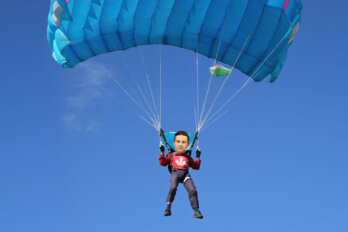2017 was the year that everything got screwed up. It was the year a reality TV star became president, the year he put forward a ban on Muslims, escalated tensions with North Korea, and refused to condemn white supremacists. It was a year of terrorist attacks and mass shootings. In Canada, much of 2017 was spent worrying about what our southern neighbour would do next. The surreality of each new event quickly supplanted the absurdity of its predecessor, and through it all, one man loomed large over our collective psyche: the rabid realtor, the swindling predator, the petty con man, the pro wrestler, the Joker, the American president.
The problem with itemizing all these plot twists is that the element of shock is lost with each retelling. It feels like a lifetime ago that rationality and order governed our world. Remember when Trump passed off highly classified intelligence to Russian spymasters in the Oval Office? When he could not distance himself from the KKK and neo-Nazis? When he put his hand on that weird orb alongside despots from the Arab world? Thanks to Twitter, we’re now in the unique position of knowing what the American president thinks the instant every irrational and preposterous thought occurs to him. Remember when he tweeted that Obama had had his “wires tapped” and was a “bad (or sick) guy!”? When he retweeted a video of himself tackling WWE’s Vince McMahon with the CNN logo superimposed on McMahon’s face?
I happened to have a peculiar vantage point as a witness to these events. I started 2017 as a law student in America, spent the middle and later months in Ottawa as an adviser to the Foreign Minister, and ended it as a writer returning to the United States. I have been an outsider looking in, and for a brief time at least, I was an insider looking out. There are many conclusions to be drawn about this year, but for me, this was the year that our culture entered a universe where the lines between reality and fantasy, the real and the fake, truth and untruth, all became blurred. The result was that our world mutated into a television show with absurd characters and life-or-death stakes. We are not the participants in this show, nor are we the spectators. We are the hostages, and if there’s a joke here, it’s on us.
I was sitting in my apartment in New Haven in January when my phone lit up with news of the Muslim ban. My first reaction was disbelief. One of the most precious pillars of American society—the welcoming of immigrants—had been knocked down. My second reaction was to chide myself for being surprised. This was the script that Trump had laid out during the campaign. Who could really be surprised? In the days after the Muslim ban was announced, I felt more vulnerable than I ever had. So did many people I loved and admired. One day, a Jewish-American friend put his arm around me and said, “Whatever happens, I’ll be there with you.” It was these little acts of kindness that made those weeks bearable.
On that cold January morning, I felt history enter our lives. There had been the election, yes, but now it was real. Trump was president. It had happened here—it being what occurred to societies rotting from within. This was not just an American tragedy; it was a tragedy for reason and for Western civilization. As the weeks passed, I began to resent the elites of the previous generation who had created the conditions for Trump’s success. And I knew that that the burden of this moral terrorism would be shouldered by the young.
My generation will have to live with the world Trump has created. We will have to correct the excesses, the irresponsibility, and the downright criminality of the two generations that have come before us. They have left us economic catastrophe, environmental degradation, wars across the Middle East, and the usurpation of all wealth by a tiny elite. They have funded their budgets and pet projects with debts financed by our labour. They have claimed to care for minorities while treating those same minorities as voting banks to be appeased every four years. And in 2017, their elite consensus could barely conceal its own hypocrisy.
What I did not see then in New Haven and what I see now is that Trump is not an aberration—he is a culmination. He is the perfect embodiment of a culture, also bequeathed to us by previous generations, hallucinating off the opiates of entertainment and egotism. He is the natural outcome of a culture addicted to trivialities and its own narcissism. Addicted to the voyeurism of reality television, to devices and distractions, to the dumbing-down of thought and the amplifying of noise. Addicted to the dopamine hits from the slot machines in its phones. A culture that knows the price of everything and the cost of nothing. It wasn’t the Muslims or the migrants who did our culture in; it was the deification of stupidity and the worship of celebrity. Trump is but a mirror image of a culture in a spiritual coma. This year, the closing of the Western mind culminated in the inauguration of an internet troll into the presidency.
Two months after graduating from Yale Law School, I took up a position as a policy adviser to the Foreign Minister. I had long admired Chrystia Freeland, going back to my days as an undergrad during the financial crisis when I read her dispatches. Moreover, I felt that Canada had invested so much in me—public schools, healthcare, government loans—that I had to use my education to give back. I chose government service.
By the time I landed in Ottawa, I already strongly believed that this was a radical moment that required a radical approach. What was not surprising—and I can say this without breaking any confidences—was that the people in power in Washington were exactly what they seemed to be. They were actors maneuvering to placate the unstable king in the Republican palace. They publicly undercut one another, and Trump undercut all of them—especially his secretary of state. And, what’s more, he welcomed the spectacle.
In his classic 1985 text Amusing Ourselves to Death, Neil Postman described how television had created a “theatre for the masses,” transforming every facet of public life into entertainment. Politics was the great example of this, the apotheosis of amusement and stage-play, the consequence of a populace hooked on being entertained instead of informed. The masses had become too ignorant and too confused and could not discern the very fact that they had become more ignorant and more confused. Politicians from Reagan to Obama to Trudeau understood that they had to play their respective characters and read from their respective scripts. What Trump understood better than all of them was what Postman predicted three decades ago: Politics was entertainment by other means and the television age rendered all substance obsolete. Ours was a Brave New World of confusion.
Postmodernists refer to the moment when reality and its simulation become indistinguishable as “hyperrreality”—that point at which at the surreal becomes the real and the virtual becomes the actual. The effect of this is that disinterested citizens can no longer separate reality from fiction. Trump proves this every day. With each tweet, each untruth, each misdirection, Trump exploits the population’s inability to think. In fact, it is much worse than Trump. Today’s hyperreality eliminates the very idea that there are independent truths at all. Craft an alternative reality—whether as the star of The Apprentice or as the star of your Instagram Story—and eventually life will catch up to the phantasmagoria. Trump does this on a global scale. He lies pathologically, not because there is a purpose to the lying but because the act of telling a lie is itself a demonstration of power. But when the gap between reality and falsity becomes too wide, when solitary truths are easily drowned out in oceans of lies, the gears of democracy stop turning. A society premised on lies produces only liars.
I knew that reality had become far too confusing and distorted when the North Korea crisis flared up this summer. As the Asia-Pacific adviser to the Foreign Minister, North Korea fell under my ambit. But I found it difficult to work through the intricacies of foreign policy when the day brought forth only absurd news stories. North Korea launched a missile and Trump threatened “fire and fury” and then, like a white rapper from New York, said America was “locked and loaded.” Kim Jong-un responded by breaking protocol and issuing his first-ever televised address, in which he likened the American president to a barking dog and called him a “mentally deranged U.S. dotard.” The foreign policy adviser in me tried to dispassionately analyze these issues and make recommendations. The Scarborough boy in me was reminded of the taunts made by bullies before a scrap in the neighbourhood.
In the era of hyperreality, it is irrational to carry on the assumptions that got us here in the first place. We citizens are somehow expected to assume that all this is fine, that the president is rational and the institutions of democracy functional. We are expected to imbue these individuals and systems with an order and logic that they do not have, simply because assuming the opposite—that the king is mad and the systems corrupt from the inside—would trigger chaos. So we dangle between a destructive status quo and a dystopian truth, mindlessly clinging to our phones and hoping that the adults have it all under control. The problem is that there are no adults in the room anymore, and the whole game is now up for grabs. The cracks continue to form in the structures around us, and the culture underlying these artifices continues to decay. If the time for revolt has not yet come, it looms over the horizon.
This December, I decided to leave my job in the foreign minister’s office. I had come to the conclusion that I would be more useful on the outside than on the inside, and I wanted to write again. My voice was my breath, and when I lost the ability to use it for half this year, I felt that I had lost a part of myself. Besides, writing—giving life to ideas and stories—felt like the most political act I could undertake in this moment, a concentrated form of question-asking that could shape the perceptions of the citizenry. And there were many questions left to ask. I was not done arguing with the world, not done looking the forces of racism and hatred in the eye and speaking like I had a right to be here.
As the earth completes its revolution around the sun and a new year arrives, I can only be grateful that I am alive. I cannot presume to have the solutions to the big issues plaguing democracy, but I do have two New Year’s resolutions that I plan to live out. The first is to spend more time having political and intellectual conversations with conservatives and the religious. I started doing this when I was in law school, training my mind to understand the arguments of those who were furthest from me, but sometime after graduation and before becoming a government official I realized that all I seemed to hear were liberal platitudes that sounded more tiresome with each passing day. Having conversations across our many racial, religious, ethnic, and ideological divides, and treating one another as serious, complex human beings may help cure some of what ails us as a culture.
My second resolution, also an extension of what I started in law school, is to create and participate in spaces of discourse—call them real safe spaces—where Trump cannot enter. The purpose of these spaces will be to let people take off their masks, forget their phones, and engage in the collective search for meaning. We all need permission to be ourselves and reveal our actual stories, but the entire culture militates towards superficiality and double-speak. It is my contention that when love and fulfillment are given the space to flourish, we will be better citizens and better people.
Next year will bring us Season Two of our earthly drama. Welcome to the post-modern, post-rational, post-truth, post-reality world. Take a seat; we’ll be here for a while.





